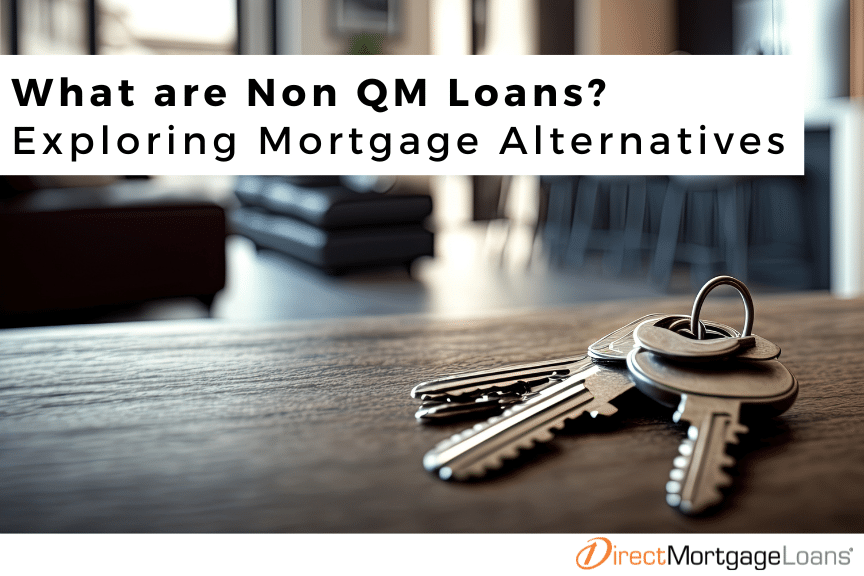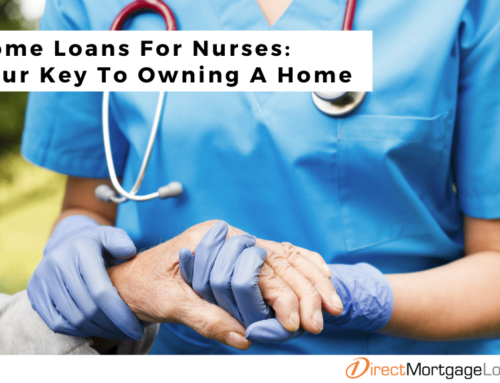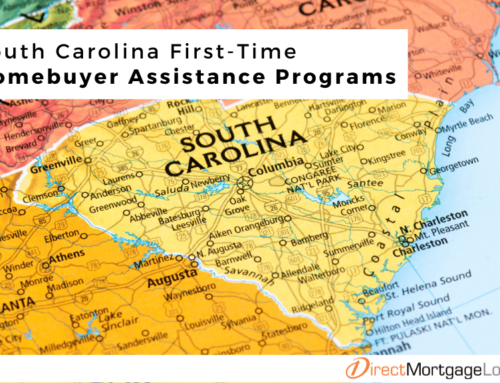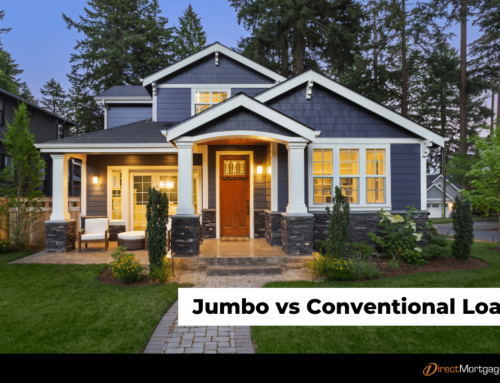What is a Non QM loan?
Non QM loans (nonqualifying Mortgage) are loans that don’t adhere to the standards set by the federal government and the Consumer Financial Protection Bureau. These loans are tailored for those who don’t meet traditional mortgage criteria. Specifically, non QM loans use alternative methods like bank statements or asset consideration for income qualification. This flexibility widens access to homeownership for a more diverse group of borrowers.
Subscribe to our blog to receive notifications of posts that interest you!
Qualifying vs Non Qualifying
Distinguishing between qualifying and non-qualifying loans comes down to their requirements and purpose. Qualifying loans are backed by government programs such as VA, FHA, and USDA, and are less risky. On the other hand, nonqualifying loans offer a more flexible application process. They cater to individuals with inconsistent incomes like freelancers, contract workers, and small business owners.
Types of Non QM Loans
There are several popular non QM loans available that Direct Mortgage Loans offers, including Bank Statement Loans, Stated Income Loans, Alternative Documentation Loans, and Investor Cash Flow.
Bank Statement Loans
A Bank Statement Loan uses bank statements to calculate a borrower’s income. It is an alternative documentation loan type. This means it does not require tax returns and W-2s for the qualification process. These loans are designed for self-employed borrowers who have substantial tax write-offs, making it challenging to demonstrate the necessary income to prove their ability to repay the loan.
Stated Income Loans
Stated Income Loans allow borrowers to declare their income without the need for traditional methods such as pay stubs or tax returns. These loans allow borrowers to qualify based on their stated income, rather than their verifiable income.
Alternative Documentation Loans
An Alternative Documentation home loan doesn’t require standard income documentation. Instead of pay stubs and tax returns, lenders may accept bank statements as proof of income. They also assess the investment’s resale potential through a property appraisal.
Investor Cash Flow
Investors who want to finance their investment properties can opt for an Investor Cash Flow Mortgage Loan. These loans usually operate on an interest-only basis. Meaning you will only be required to make payments on the loan’s interest during the initial years.
After the interest-only period ends, the payments will shift to cover the loan’s principal. This financing option is ideal for those who want to manage their cash flow and want to invest in properties.
ITIN Loans
ITIN home loans are a specialized form of financial assistance designed specifically for individuals who possess an Individual Taxpayer Identification Number (ITIN) instead of a Social Security Number (SSN). Unlike traditional loans that require an SSN, ITIN loans offer an alternative path to financial support for individuals and their dependents or spouses who do not have an SSN. These loans have distinct eligibility criteria and terms. They provide opportunities for various purposes and are granted based on factors such as creditworthiness and income.
Non QM Loan Requirements
To be eligible for a nonqualified mortgage loan, borrowers generally need to fulfill specific criteria based on the program they are applying for. Typically, borrowers are required to demonstrate a stable source of income, attain a minimum credit score, and possess the capability to make a down payment. Furthermore, borrowers may be asked to provide additional documentation and financial records to verify their capacity to repay the loan.
Pros and Cons of Non QM Loans
Non QM loans could be a good option for those who don’t fit the mold of traditional loans. However, it’s important to consider the pros and cons before making a decision.
Pros of Non QM Loans
Non QM mortgages offer flexible underwriting criteria. They can cater to borrowers who don’t qualify for traditional mortgage guidelines due to various reasons, such as a high debt-to-income ratio or a non-traditional income source. Additionally, some non QM loans come with higher borrowing limits for those looking to purchase more expensive properties or access more substantial cash.
Faster approval times are also a common feature since non QM loans are often underwritten in-house by the lender, and they may be approved more quickly than traditional mortgages, which can involve a lengthy approval process.*
Moreover, non QM loans are more suitable for self-employed individuals, who may struggle to prove income through conventional means. These loans offer more options for proving income, making it easier for self-employed individuals to secure financing for their dream home.
Nevertheless, although non QM loans are considered higher risk, they may come with higher interest rates. In some cases, borrowers may be able to secure lower rates than they would with a traditional mortgage due to the flexibility of the loan terms. **
*When compared to turn times for conventional programs. Approval times may vary depending on individual circumstances.
**Rates are subject to market changes
Cons of Non QM Loans
Although non QM loans provide borrowers with more flexibility, they also have some potential drawbacks. One of the main disadvantages is that these loans may come with higher costs. Lenders could charge higher interest rates, origination fees, and closing costs to cover the risks they face by offering these loans.
Another drawback is that non QM loans might have stricter repayment terms. Borrowers may have to pay back the loan in a shorter period or face penalties for paying it back early.
Because non QM loans are more flexible but more expensive, they carry a higher risk of default if not managed carefully. Borrowers need to be aware of these risks and ensure they can meet the repayment terms before taking out a non QM loan.
Alternatives to Non QM Home Loans
Some alternatives to non QM home loans include Conventional, FHA, USDA, and VA Loans.
Conventional Loans
This is a type of conforming loan, meaning that it meets the conventional loan requirements for a Fannie Mae or Freddie Mac loan, though it is not backed by the government, which makes it simpler to comply with these loans. Typically viewed as the 20% down mortgage solution, conventional loans come in all shapes and sizes.
FHA Loans
FHA Loans are governed by the Housing of Urban Development (HUD), which offers flexible guidelines for borrowers with limited down payment funds and an imperfect credit history. Since FHA loans require lower credit scores and down payments, they are especially popular among first-time home buyers.
FHA 100% Financing
This program provides homebuyers with 100% financing without requiring a down payment. However, closing costs are still required. This is achieved through a combination of a 1st and 2nd mortgage. This DPA program can be used to obtain an FHA loan and the amount of the 2nd mortgage can be up to 3.5% of the sales price or the appraised value, whichever is less. The term for the 2nd mortgage is 10 years.
- Eligibility
- To qualify for the program, you need to have a minimum credit score of 620 and a maximum Debt-to-Income (DTI) ratio of 45%. You must complete a Homebuyer Education course. And the eligible properties for financing are defined by FHA guidelines based on the maximum HUD county limit. The program covers single-family homes, duplexes, manufactured homes, PUDs, townhouses, and condos.
USDA Loans
Designed to assist low-to-moderate-income borrowers in rural areas to purchase a home. These loans offer flexible guidelines and require no down payment. They are government-insured and can only be used for purchasing a home in a designated rural area. USDA loans are a helpful option for those who have limited funds for a down payment and wish to buy a home in a rural area.
VA Loans
A VA loan is a flexible, $0-down payment mortgage loan option, partially backed by the Department of Veterans Affairs. People utilize VA loans to purchase a primary property or refinance an already existing mortgage.
How to Apply for a Non Qualified Loan
- Connect with a lender: Contact a Direct Mortgage Loans Loan Officer to discuss your financing needs and start the process.
- Collect required documents: Before applying for a non QM loan, gather essential documentation such as proof of income, tax returns, and bank statements. Be prepared to provide additional documentation to verify your income and employment history.
- Submit your application: Start your loan application by filling out the necessary forms. You can apply easily (and securely) from your desktop or mobile phone using the DML App!
- Attain pre-approval: After submitting your application, the lender will review your information and issue a pre-approval letter. This letter outlines the eligible loan amount, interest rate, and other key loan terms.
- Search for a property: With pre-approval in hand, begin searching for a property that suits your needs and budget. Work with a real estate agent to facilitate the process.
- Close the loan: Upon finding a suitable property and agreeing on the purchase price, the lender will conduct a final underwriting review and issue a loan commitment letter. Once received, proceed to close the loan and take ownership of your new home.
How can I find Non QM mortgage lenders near me?
If you’re looking for non QM mortgage lenders near you, Direct Mortgage Loans offers a variety of nonqualifying loans, and our expert loan officers are well-versed in these programs. Simply connect with one of our direct mortgage lenders today!
Non QM Loan FAQ’s
What makes Non QM loans different?
Non QM loans provide flexibility for borrowers who fall outside traditional credit score or income requirements when it comes to being approved for a home loan. They consider alternative income sources, higher debt ratios, but come with trade-offs: higher interest rates, larger down payments, and potentially less risk protection.
Are non QM loans more expensive?
Non QM mortgage products could be more expensive than traditional home loans due to their higher risk for lenders. Unlike conventional mortgages that are backed by Fannie Mae or Freddie Mac, or government backed mortgages, there is a lack of guarantee, making them riskier for lenders. To compensate for this added risk, lenders may require higher down payments and interest rates. This results in a higher overall cost for borrowers.
Are non QM loans risky?
While non QM loans come with higher risks, they are still subject to underwriting and regulatory oversight. Borrowers should ensure they understand the terms and work with reputable lenders to mitigate risks.
Is a non QM loan the same as a conventional loan?
No, non QM loans are different from conventional loans in terms of eligibility, documentation, interest rates, and guarantees. Conventional loans are backed by Fannie Mae and Freddie Mac and have specific guidelines and eligibility criteria. On the other hand, non QM loans offer an alternative path to homeownership for borrowers who don’t meet traditional lending parameters. However, these loans come with higher costs and potentially more risk compared to conventional loans.
Are Non QM Loans accessible for self-employed individuals?
Yes, non QM loans can be a good option for self-employed individuals who have difficulty proving income through traditional W-2 forms. They may be able to qualify based on bank statements, tax returns, or other forms of documentation. If you’re a self-employed individual interested in purchasing a home, contact one of our expert loan officers today.
Can you refinance out of a non QM loan?
Yes, you can refinance out of a non QM loan, however if you’re thinking about refinancing to a government-backed loan with lower rates, it’s important to consider all the costs and benefits. Speak with an expert loan officer to understand your options.






Leave A Comment
You must be logged in to post a comment.